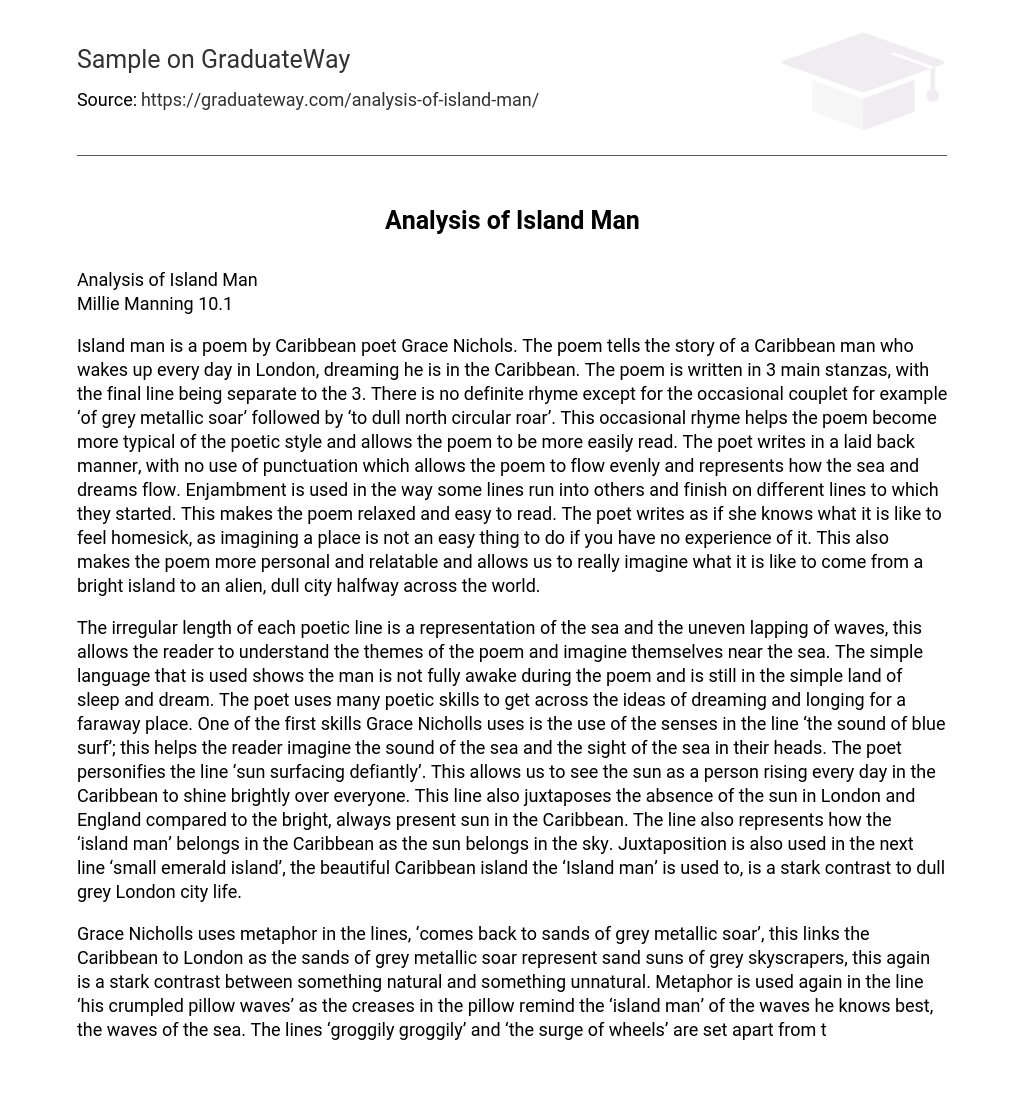Island Man, a poem written by Grace Nichols, depicts the tale of a Caribbean man residing in London who yearns to be back in his homeland. This piece is structured into three primary stanzas and incorporates occasional rhymes like “of gray metallic soar” juxtaposed with “to dull north circular roar,” enhancing its poetic allure and ease of comprehension. The poet’s relaxed writing style, lack of punctuation, and enjambment all contribute to the seamless flow of the poem, mirroring the rhythm of both the sea and dreams.
The poet effectively conveys the sensation of longing for home by skillfully depicting the act of envisioning a place one has never visited. This technique imbues the poem with an intimate and relatable essence, enabling us to vividly visualize the emotions involved in departing from a vibrant island and arriving in a foreign and mundane city on the opposite side of the world.
The poem’s uneven line lengths symbolize the sea and its irregular waves, helping readers to envision themselves near the ocean and understand the poem’s themes. The simple language indicates that the speaker is still in a state of sleep and dreams. The poet effectively employs various techniques to convey a sense of longing and longing for a distant place. For example, Grace Nicholls uses sensory imagery with the phrase ‘the sound of blue surf,’ allowing readers to imagine the auditory and visual aspects of the sea. Additionally, the poet personifies the sun as it ‘surfaces defiantly,’ giving it human qualities and showing how it rises every day in the Caribbean, casting a bright light over everyone.
The absence of the sun in London and England is juxtaposed with the bright, always present sun in the Caribbean in this line. It represents how the ‘island man’ belongs in the Caribbean just as the sun belongs in the sky. Juxtaposition is also seen in the next line with the mention of the ‘small emerald island’ – a beautiful contrast to the dull gray city life of London.
Grace Nicholls employs metaphor in her poem to highlight the connection between the Caribbean and London. The phrase “comes back to sands of gray metallic soar” symbolizes how sand suns of gray skyscrapers represent the urban landscape in contrast to nature. Another metaphor is seen in “his crumpled pillow waves,” which evokes the image of waves in the sea, reminding the ‘island man’ of his home. Additionally, the lines “groggily groggily” and “the surge of wheels” are set apart to signify the physical distance that separates the man from the Caribbean as he experiences life in London.
The author suggests that the man in the poem is gradually returning to reality after his dream, with the separate lines indicating this transition. The repetition of “groggily” emphasizes his reluctance and slow awakening. Additionally, the phrase “groggily groggily” highlights his strong desire to stay in his dreams of the “emerald island.” The phrase “the surge of wheels” implies that the man is trying to push thoughts of London out of his mind as he longs to remain in the Caribbean. The penultimate line, “island man heaves himself,” further illustrates his resistance to leaving his dream and returning to London. The poet employs ambiguity in the phrase “in his head,” suggesting that either the man is not at home or that home exists solely in his mind. The real interpretation of this line remains unclear, leaving it up to the reader to decide. The phrase “steady breaking and wombing” represents the sounds of the waves, connecting it to the restless nature of the man. Just as the sea appears calm but can quickly become turbulent, he never truly feels settled before having to move again.
The poet introduced the term ‘wombing’ to represent the feeling of security in the womb, as well as the safety found in the sea, similar to being in a womb. The poem depicts both joyful and sorrowful themes through the man’s memories of home, emphasizing his happiness when reminiscing about his homeland and his sadness due to being in London. This allows readers to understand and connect with the man’s emotions and see things from his perspective. The distinction between happiness and sadness is evident in stanzas 2 and 3, where vibrant and optimistic descriptions of the island contrast with the plain and monotonous depiction of London.
The poem concludes with the line ‘Another London day’, creating a definitive and conclusive statement that suggests the man’s routine of waking up to disappointment in London. This indicates that his dreams of home are not occasional occurrences but a daily struggle. Through her descriptive skills and language, the poet effectively allows readers to empathize with the character, despite my personal difficulty in relating to themes like this due to limited experience of moving. Nonetheless, the poet’s writing style and clever poetic techniques immerse me in the mind of the ‘island man’, evoking genuine emotions and a longing for an unfamiliar island.





